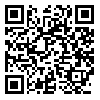Volume 13, Issue 4 (Winter 2012)
Advances in Cognitive Sciences 2012, 13(4): 71-79 |
Back to browse issues page
1- of computer engineering / artificial intelligence, Iran University of Science and Technology, Tehran, Iran.
2- Assistant Professor, Department of Computer Engineering, Iran University of Science and Technology, Tehran, Iran.
3- Assistant Professor, Department of Education and Psychology, University of Tehran, Tehran, Iran.
2- Assistant Professor, Department of Computer Engineering, Iran University of Science and Technology, Tehran, Iran.
3- Assistant Professor, Department of Education and Psychology, University of Tehran, Tehran, Iran.
Abstract: (3362 Views)
Objective: A computational cognitive architecture for simulating the effect of trait anxiety on working memory.
Method: The research used Big Five theory of personality as its psychological basis. It simulated the effect of trait anxiety on working memory. The study proposes a model of personality based on fuzzy theory and the effect of trait anxiety on retrieval threshold is modeled based on up-to-date psychological references and comments of experts. The extended personality model is embedded in ACT-R cognitive architecture to make it capable of making decisions and processing information based on personality factor.
Results: The model is able of simulating human behavior at an acceptable level with respect to being compared with experimental data and psychological papers.
Conclusion: Anxiety is one of the most important personality traits that affect human behavior, specially working memory. Accordingly, embedding this factor in computational cognitive models can improve their precision.
Method: The research used Big Five theory of personality as its psychological basis. It simulated the effect of trait anxiety on working memory. The study proposes a model of personality based on fuzzy theory and the effect of trait anxiety on retrieval threshold is modeled based on up-to-date psychological references and comments of experts. The extended personality model is embedded in ACT-R cognitive architecture to make it capable of making decisions and processing information based on personality factor.
Results: The model is able of simulating human behavior at an acceptable level with respect to being compared with experimental data and psychological papers.
Conclusion: Anxiety is one of the most important personality traits that affect human behavior, specially working memory. Accordingly, embedding this factor in computational cognitive models can improve their precision.
Type of Study: Research |
Subject:
Special
Received: 2011/08/23 | Accepted: 2011/10/23 | Published: 2011/12/22
Received: 2011/08/23 | Accepted: 2011/10/23 | Published: 2011/12/22
| Rights and permissions | |
 |
This work is licensed under a Creative Commons Attribution-NonCommercial 4.0 International License. |


